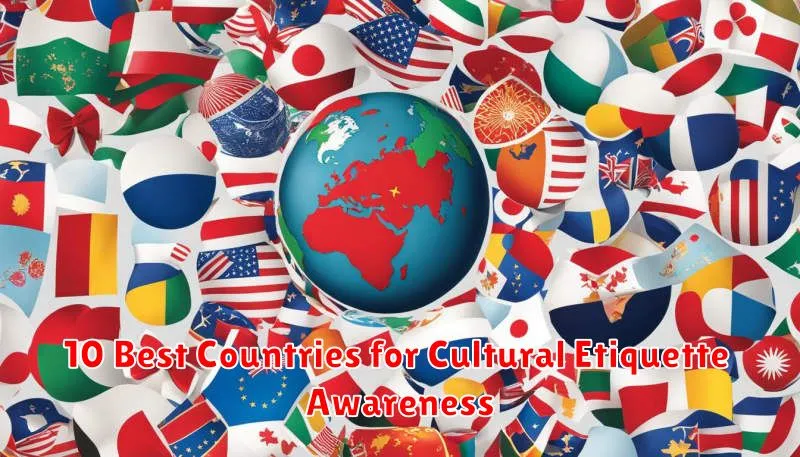In an increasingly interconnected world, cultural etiquette awareness is more crucial than ever. Whether for business, travel, or personal enrichment, understanding the nuances of different cultures can significantly enhance communication, build stronger relationships, and foster mutual respect. This article explores the 10 best countries that exemplify the importance of cultural etiquette, providing valuable insights into their customs and traditions. By examining these exemplary nations, we can learn valuable lessons about navigating intercultural interactions with sensitivity and grace. Developing strong cultural etiquette awareness is essential for anyone seeking to thrive in a globalized environment.
From the intricate tea ceremonies of Japan to the formal greetings of Switzerland, the 10 best countries for cultural etiquette awareness offer a wealth of knowledge for those seeking to broaden their understanding of global customs. This exploration of cultural etiquette will delve into the specific practices that distinguish these nations, highlighting the importance of respecting cultural differences. Whether you’re a seasoned traveler, a global business professional, or simply curious about other cultures, discovering the best countries for cultural etiquette awareness can be a rewarding and enlightening experience. Embracing cultural etiquette not only demonstrates respect but also unlocks opportunities for deeper connection and understanding in our increasingly diverse world.
Why Cultural Etiquette Matters Abroad
Observing cultural etiquette while traveling abroad is essential for a multitude of reasons. It demonstrates respect for the local culture, fostering positive interactions and avoiding misunderstandings.
Proper etiquette can significantly enhance your travel experience. Locals are more likely to be receptive and helpful to visitors who demonstrate an awareness and appreciation of their customs. This can lead to more authentic and enriching interactions, opening doors to unique experiences you might otherwise miss.
Moreover, understanding cultural nuances can prevent unintentional offense. Gestures, greetings, and even dining habits can vary significantly between cultures. What may be considered polite in one country could be interpreted as rude or disrespectful in another. Being mindful of these differences helps avoid awkward situations and promotes smooth communication.
Finally, cultural sensitivity contributes to a more positive and peaceful global environment. By demonstrating respect for other cultures, we build bridges of understanding and promote cross-cultural harmony.
Tips for Being Respectful Globally
Demonstrating respect across cultures involves understanding and adapting to varying customs and traditions. Active listening is crucial. Pay attention to what people are saying and how they are saying it. This helps you understand their perspective and avoid misinterpretations.
Learn basic greetings and phrases in the local language. Even a simple “hello” or “thank you” demonstrates effort and respect. Be mindful of body language. Gestures that are acceptable in one culture may be offensive in another. Research common customs beforehand.
Be punctual, as the perception of time varies across cultures. In some places, being late is considered highly disrespectful. Dress modestly and appropriately for the cultural context. When in doubt, it’s always best to err on the side of caution.
Finally, be open-minded and adaptable. Embrace differences and avoid making judgments based on your own cultural norms. Showing genuine curiosity and a willingness to learn will go a long way in fostering respectful interactions.
Japan

Japan is renowned for its deeply ingrained culture of respect and politeness. Bowing is the customary greeting, and the depth and duration of the bow reflect the level of respect shown. A slight nod is sufficient for casual interactions, while a deeper, longer bow is appropriate for formal occasions or when meeting someone of higher social standing.
Gift-giving is another important aspect of Japanese etiquette. Presenting and receiving gifts with both hands demonstrates respect. It’s customary to politely refuse a gift a few times before accepting it, and opening a gift in front of the giver is generally avoided.
Dining etiquette also plays a significant role. It’s considered polite to say “itadakimasu” (I humbly receive) before eating and “gochisousama deshita” (thank you for the meal) afterward. Using chopsticks correctly is essential, and sticking them upright in a bowl of rice is a cultural taboo, as it resembles funeral practices.
Germany

Germany, a nation rich in history and culture, places a strong emphasis on formality and direct communication. Understanding these cultural nuances is key to navigating social and business interactions effectively.
Greetings are typically formal. A firm handshake, accompanied by direct eye contact, is the standard. Addressing individuals using their titles (e.g., Herr Doktor, Frau Professor) is common, especially in professional settings. Using first names is generally reserved for close friends and family.
Punctuality is highly valued in German culture. Arriving on time, or even a few minutes early, for appointments demonstrates respect. Being late is considered rude and unprofessional.
Table manners are also important. Wait for the host to begin eating before you do. It is considered polite to keep your hands visible on the table and to finish everything on your plate.
India

India presents a rich tapestry of cultural nuances, making etiquette awareness crucial for visitors. Greetings often involve a slight bow with hands pressed together in a “Namaste” gesture. Physical contact is generally avoided, particularly between men and women. The use of the right hand for eating and giving or receiving items is considered essential. Footwear is typically removed before entering homes and places of worship.
Dress modestly, especially when visiting religious sites. Covering your head is often expected in temples and mosques. Public displays of affection are generally frowned upon. Conversations about politics and religion should be approached with sensitivity. Bargaining is common in markets, but approach it respectfully. When invited to someone’s home, a small gift is a thoughtful gesture.
Being mindful of these customs demonstrates respect and contributes to a positive cultural exchange.
Thailand

Thailand, often referred to as the “Land of Smiles,” places a strong emphasis on respect and politeness. Understanding and observing proper etiquette is crucial for a positive experience.
A key aspect of Thai etiquette revolves around the concept of “saving face.” Avoiding causing embarrassment or shame to oneself or others is paramount. Speaking in a calm and respectful tone is essential, even in challenging situations.
The wai, a slight bow with hands pressed together in a prayer-like gesture, is the traditional Thai greeting. It is a sign of respect and is used in various social interactions.
Feet are considered the lowest and dirtiest part of the body. Avoid pointing your feet at people or sacred images, such as Buddha statues. Remove your shoes before entering homes and temples.
The head, conversely, is considered the most sacred part of the body. Refrain from touching someone’s head, even children.
Morocco

Morocco, a North African nation bordering the Atlantic and Mediterranean, offers a rich tapestry of cultural traditions. Respectful interaction is paramount when navigating this vibrant country.
Greetings are important. A handshake is customary, often accompanied by a touch to the chest with the right hand afterward. For those close, cheek kisses may be exchanged, typically three. Inquire about family and well-being as a sign of genuine interest.
Dress modestly, particularly when visiting religious sites. Covering shoulders and knees is generally recommended. Right hands are used for eating and offering items as the left hand is traditionally considered unclean.
Bargaining is expected in souks and markets but maintain a respectful demeanor throughout the process. Accepting mint tea is a sign of courtesy and declining may be seen as rude.
South Korea

South Korea is a nation steeped in tradition, where understanding cultural etiquette is crucial for positive interactions. Showing respect for elders is paramount, demonstrated through language and gestures. When addressing someone older, use honorific titles and avoid informal speech.
Bowing is the customary greeting, and the depth of the bow reflects the level of respect. Business cards should be exchanged with two hands, and taking time to examine the card shows respect for the other person’s position.
Table manners also play a significant role. It is considered impolite to begin eating before the eldest person at the table. Refusing a drink offered to you is seen as disrespectful, especially in a social setting. Pouring your own drink is acceptable, but offering to pour for others, particularly elders, is a sign of respect.
Italy

Italy, a country steeped in rich history and tradition, places significant emphasis on etiquette. Demonstrating cultural sensitivity is key to fostering positive interactions with Italians.
Greetings are typically formal. A handshake is common, especially in professional settings. Among friends and family, cheek kisses (usually two, starting with the right cheek) are customary. Address individuals using their titles (e.g., “Signor,” “Signora,” “Dottore”) until invited to use their first names.
Dining etiquette also plays a vital role. Wait to be seated, and avoid starting to eat before everyone is served. It’s considered polite to finish everything on your plate. Keep your hands visible at the table, and avoid using your phone during the meal. Offering to split the bill can sometimes be misinterpreted, especially if you are the host, as it’s customary for the host to pay.
Dress code tends to be relatively formal, particularly in business and religious contexts. Modest attire is recommended when visiting churches or other religious sites.
Vietnam

Navigating Vietnamese culture requires sensitivity and respect. Greetings are typically formal, often accompanied by a slight bow. Addressing individuals by their title and last name is essential, especially in professional settings.
Gift-giving is a common practice. Small, thoughtful presents are appreciated, and it’s polite to offer and receive gifts with both hands. Dining etiquette involves using chopsticks and sharing dishes. It’s considered respectful to leave a small amount of food on your plate to indicate you are satisfied.
Public displays of affection are generally frowned upon, and modest dress is recommended, especially when visiting religious sites. Removing shoes before entering homes and some businesses is customary. When engaging in conversations, avoid discussing sensitive topics like politics or religion.
France

France, a country steeped in history and tradition, places a high value on etiquette. Politeness and respect are cornerstones of French culture.
Greetings are essential. A handshake is common in professional settings, while close friends and family often exchange bisous (light kisses on the cheek). Addressing individuals formally with “Monsieur” or “Madame” is expected unless otherwise invited to use first names.
Table manners are also important. Keep your hands visible at the table, and avoid speaking with your mouth full. It’s considered polite to finish everything on your plate. Bringing a gift of wine or flowers to a dinner party is customary.
Conversation typically revolves around art, culture, or current events. Avoid discussing personal finances or sensitive topics. The French appreciate intellectual discourse and a nuanced perspective.

